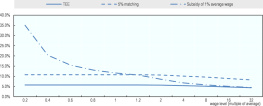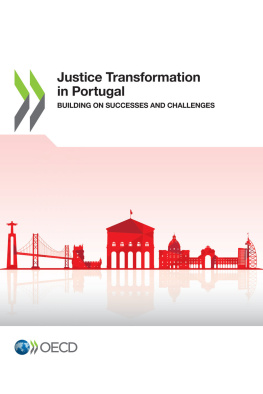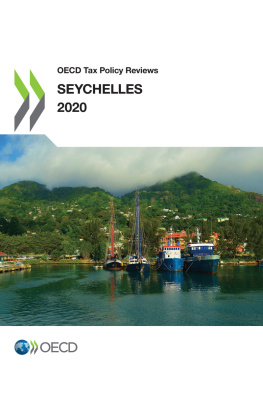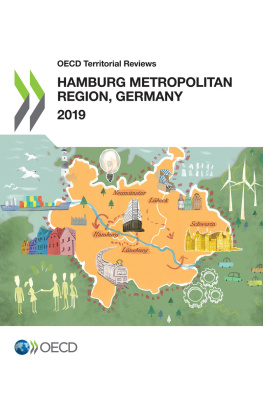OECD - OECD Reviews of Pension Systems: Portugal
Here you can read online OECD - OECD Reviews of Pension Systems: Portugal full text of the book (entire story) in english for free. Download pdf and epub, get meaning, cover and reviews about this ebook. year: 2019, publisher: OECD Publishing, genre: Politics. Description of the work, (preface) as well as reviews are available. Best literature library LitArk.com created for fans of good reading and offers a wide selection of genres:
Romance novel
Science fiction
Adventure
Detective
Science
History
Home and family
Prose
Art
Politics
Computer
Non-fiction
Religion
Business
Children
Humor
Choose a favorite category and find really read worthwhile books. Enjoy immersion in the world of imagination, feel the emotions of the characters or learn something new for yourself, make an fascinating discovery.
OECD Reviews of Pension Systems: Portugal: summary, description and annotation
We offer to read an annotation, description, summary or preface (depends on what the author of the book "OECD Reviews of Pension Systems: Portugal" wrote himself). If you haven't found the necessary information about the book — write in the comments, we will try to find it.
OECD: author's other books
Who wrote OECD Reviews of Pension Systems: Portugal? Find out the surname, the name of the author of the book and a list of all author's works by series.
OECD Reviews of Pension Systems: Portugal — read online for free the complete book (whole text) full work
Below is the text of the book, divided by pages. System saving the place of the last page read, allows you to conveniently read the book "OECD Reviews of Pension Systems: Portugal" online for free, without having to search again every time where you left off. Put a bookmark, and you can go to the page where you finished reading at any time.
Font size:
Interval:
Bookmark:

OECD (2019), OECD Reviews of Pension Systems: Portugal , OECD Reviews of Pension Systems, OECD Publishing, Paris.
https://doi.org/10.1787/9789264313736-en
This Pension Review provides an assessment of Portugals retirement income provision from an international perspective and focuses on the capacity of the pension system to deliver adequate retirement income in a financially sustainable way. The review highlights OECD best practices for the design of pensions by covering all components of pension systems: public, occupational and personal plans as well as schemes for public sector employees. The analysis is based on both OECD flagship pension publications, Pensions at a Glance and Pensions Outlook, and country-specific sources and research.
The report was prepared by a team of pension analysts from the OECDs Directorate for Employment, Labour and Social Affairs and Directorate for Financial and Enterprise Affairs: Pablo Antolin, Boele Bonthuis, Herv Boulhol, Diana Hourani, Ananita Kusumaningsih, Marius Lske and Stphanie Payet. Editorial assistance was provided by Liv Gudmundson and Lucy Hulett.
The OECD is very grateful to numerous public officials in the Portuguese Ministry of Labour, Solidarity and Social Security particularly, Jos Antnio Vieira da Silva (Minister), Mariana Trigo Pereira (Chief Economist), Tiago Prequia (Head of Cabinet) and Rogrio Silveira (Technical Advisor) for their invaluable help and input. The OECD would also like to thank the Portuguese Insurance and Pension Funds Supervisory Authority, particularly Sofia Frederico who provided useful data and comprehensive comments. The report benefited greatly from discussions with a wide range of experts and officials during the OECD mission in Lisbon in July 2018, with officials from the Directorate-General for Employment, Social Affairs and Inclusion at the European Commission and with Delegates of the OECD Working Party on Social Policy.
The authors are very grateful to Stefano Scarpetta (ELS Director), Mark Pearson (ELS Deputy Director), Monika Queisser (ELS Head of Social Policy Division) and Christian Geppert, Maciej Lis and Andrew Reilly (ELS Pension Analysts) for their useful comments. The Review was written under the overall supervision of the OECD Secretary-General, Angel Gurra, and the Special Counsellor to the Secretary-General, Gabriela Ramos.
The OECD gratefully acknowledges the financial support from the European Commission. The opinions expressed and arguments employed herein should not be taken to reflect the official views of the Portuguese government, the European Union or its member countries.
This review provides a detailed analysis of the different components of the Portuguese pension system, which consists of an old-age safety net, a pay-as-you-go earnings-related public scheme and voluntary private pensions. It assesses the system according to the OECD best practices and guidelines, and draws on international experiences to make recommendations for improvement. It also addresses the effects of recent labour market trends on future retirement benefits and on the pension coverage of workers in non-standard forms of employment.
Portugal is ageing rapidly. The projected decrease of the working-age population until 2050 will be among the largest in the OECD, leading to a substantial fall in the number of contributors to the pension system. Retirement finances will be put under stress as a result. Old-age inequality is high in Portugal but thanks to safety-net provisions, the relative old-age poverty rate is below the OECD average. The labour market has been recovering from the deep and prolonged crisis of 2008-09 in Portugal and employment rates are now close to the OECD average. Yet, for those who were affected the crisis is likely to leave its mark on future pensions. The main recommendations are presented below.
Simplify non-contributory benefits to avoid the multiplication of instruments with similar objectives. In particular, merge the old-age social pension, the complement (CES) and the top-up (CSI), and remove the CSIs means testing to descendants income . The interaction between numerous non-contributory schemes pursuing similar objectives is unduly complex. Means-testing the CSI not only at the household level but also including descendants income might cut cost by restricting the number of beneficiaries but makes the pension system complicated. The administrative complexity generates costs and long waiting times, and some people may be discouraged or uncomfortable to have their childrens income means-tested.
Lower the minimum contribution period of 15 years required for the minimum pension, adjust the benefit level accordingly and ensure that each additional year of contribution results in a higher minimum pension benefit . For those currently entering the labour market there are three levels of minimum pensions available: one for those with 15-20 years of contributions, one for those with 21-30 years of contributions and one for those with 31 years of contributions or more. In Portugal, the minimum pension provides little additional benefit from working longer. Only those with contributory periods just below the thresholds of 15, 21 and 31 years benefit from working longer in terms of the minimum pension.
Separate the uprating of the initial minimum pension benefit at retirement from the indexation of minimum pensions in payment . The uprating of the initial benefit should be closely related to average- or minimum-wage growth to ensure a stable level relative to labour income over time.
Font size:
Interval:
Bookmark:
Similar books «OECD Reviews of Pension Systems: Portugal»
Look at similar books to OECD Reviews of Pension Systems: Portugal. We have selected literature similar in name and meaning in the hope of providing readers with more options to find new, interesting, not yet read works.
Discussion, reviews of the book OECD Reviews of Pension Systems: Portugal and just readers' own opinions. Leave your comments, write what you think about the work, its meaning or the main characters. Specify what exactly you liked and what you didn't like, and why you think so.



















